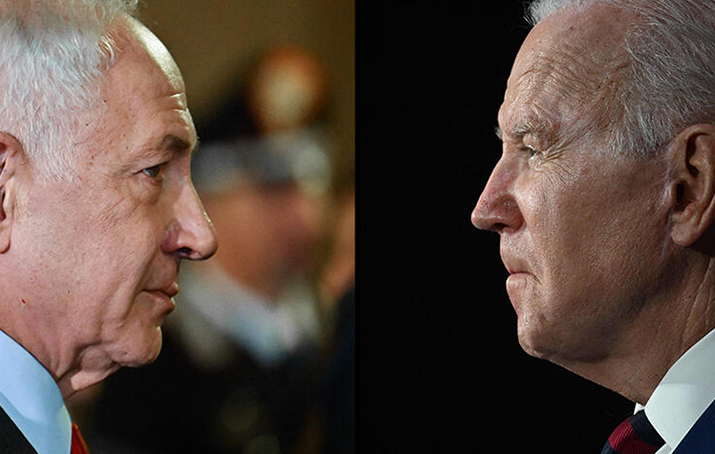How can one agree to the establishment of a Palestinian state when the majority of Palestinians align themselves with Hamas, and support for the terror group has only increased following the atrocities committed on October 7? How can one support a two-state solution when it's clear ahead of time that a Palestinian state will quickly fall under Hamas’ control?
More stories:
And how can one support a Palestinian entity when it's evident that it's a strategic achievement for Iran? Iran already has full control of Yemen in the south and Lebanon in the north, and it partially controls Syria. Is it wise to grant it control over territories that overlook Israel at such a close proximity?
It would be outright foolish to ignore these questions. We mustn’t ignore them. And one must ask, mainly, whether the Americans don't know what most Israelis do. After all, one doesn't need to be a right-winger to ponder this.
So how is it that U.S. President Joe Biden, who, seeing the support he has given to Israel since October 7, is the friendliest U.S. president to Israel since its establishment, is pressuring Prime Minister Benjamin Netanyahu to agree to a "two-state solution"?
Well, it can be assumed that the American government knows exactly what most Israelis already know. However, it’s not that every move the U.S. government makes in the Middle Eastern context reflects any deep thinking and wisdom. They make mistakes as well. But it seems they still know what they’re talking about.
Because they know that a Palestinian state won't emerge tomorrow or in a year, even if a coalition led by the Meretz party is formed in Israel. It won't happen because the Palestinians have received numerous proposals to form a state in the last century. They always refused. They refused Ehud Barak, Bill Clinton, Ehud Olmert, Barack Obama, and Donald Trump. So now, they’ll suddenly agree?
So why are the Americans still pressuring Israel? Firstly, they need a substantial deal with Saudi Arabia, which includes both a U.S.-Saudi defense agreement and normalization between Saudi Arabia and Israel.
For this to happen, Israel needs to be flexible regarding the Palestinian issue. One of the reasons for Hamas’ attack, if not the primary one, was to ensure the failure of this deal. Because the implications of this deal mean a strategic change that weakens Iran, Russia, and China, making the U.S. the most influential player in the region.
Such an agreement has economic implications in the trillions of dollars, as it’ll enable an economic corridor crossing from India through Saudi Arabia, Jordan, Israel, and into Europe. Therefore, the U.S. doesn't need a Palestinian state; it needs Israeli consent to a Palestinian state to facilitate Saudi progress toward the deal on the table.
Secondly, there’s almost no serious political figure in the West in general, and specifically in the United States, who supports the Israeli settlement policy. It's a red flag. It's a project that promotes and encourages the most absurd accusations against Israel.
There’s consensus on this matter, from Bernie Sanders to Nikki Haley, from Barack Obama to Donald Trump. The "two-state" approach, even in the case a Palestinian state wouldn’t be established, is considered in the U.S. as a Zionist approach.
The anti-Zionist bloc supports one state from the Mediterranean Sea to the Jordan River. The anti-Zionist bloc from the right, not exclusive to Bezalel Smotrich and Itamar Ben-Gvir, is the executor of the terrible vision of a single state.
Against this backdrop, Netanyahu's attempt to confront the American government looks like a political shamble. The U.S. left wing has its own issues, however. Just this week, 11 Democratic senators demanded to condition aid to Israel on a report detailing its protection of human rights. Another 20 senators tied support for the deal with Saudi Arabia, among other things, on Israel's agreement to the two-state solution.
Reports published last week said even Israel's friends were "shocked" by Netanyahu's refusal to show flexibility on the Palestinian front. According to Biden's statement after a talk with Netanyahu, the "two-state" option isn’t off the table. Is this a turning point?
Netanyahu should have realized a long time ago that there’s a need for a more realistic stance, not to establish a state for Hamas a stone's toss from Kfar Saba, but to allow the U.S. government's continued assistance to Israel and to facilitate normalization with Saudi Arabia.
Netanyahu’s office issued a statement in which he insists on "Complete control of security in the Gaza Strip," an issue that "conflicts with the demand for Palestinian sovereignty." This was primarily a politically motivated statement that didn’t outright deny the possibility of the Palestinian state. Right-wing figures, including from the Likud, rushed to publish statements saying a Palestinian state would never be established.
 Ben-Dror YeminiPhoto: Abigail Uzi
Ben-Dror YeminiPhoto: Abigail UziBiden is applying pressure. Will Netanyahu act according to Israel and the U.S.’s shared strategic interests, or will he follow the vision of a single state led by Smotrich and Ben-Gvir? It’s doubtful whether Netanyahu will provide a clear answer. But there’s concern that this narrow political interest, once again, will overshadow Israel’s national interests.







